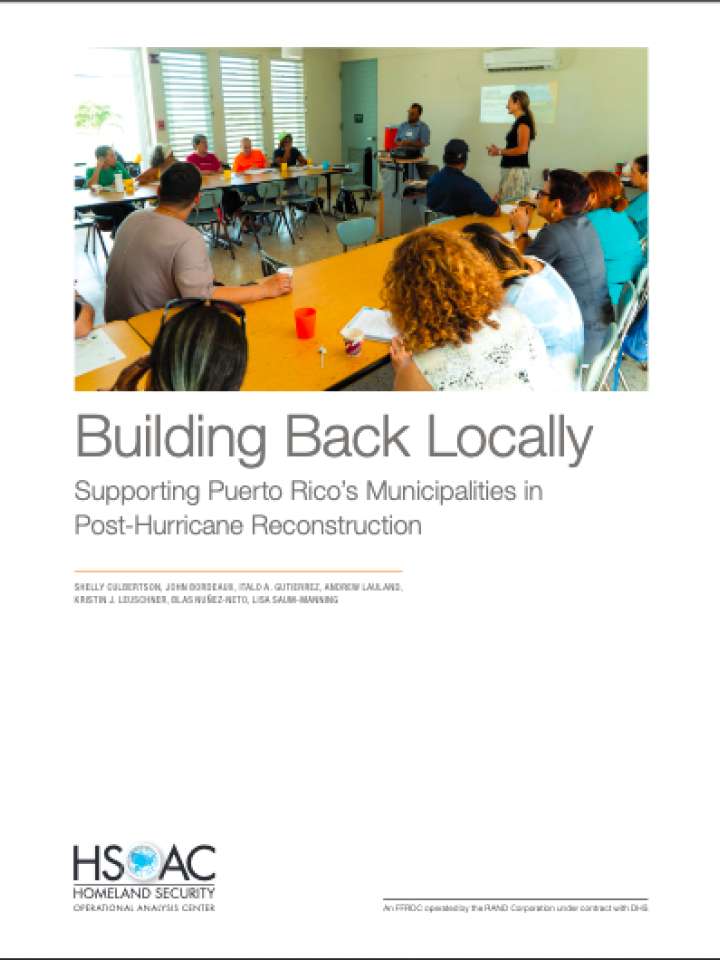Building back locally : Supporting Puerto Rico's municipalities in post-hurricane reconstruction
Successful reconstruction in Puerto Rico depends crucially on the administrative, management, and fiscal capacity of Puerto Rico's 78 municipal governments. Municipalities will be responsible for an estimated $4 billion in reconstruction funds and will need to manage complex reconstruction projects while coordinating with the government of Puerto Rico and federal government.
Drawing on best-practice frameworks, available data, interviews with personnel from FEMA and COR3, and case studies of both municipalities and reconstruction projects, the authors analyze municipalities' capacity and needs in four key areas: strategy, management, operations, and finance and administration. They present recommendations to help FEMA and COR3 target scarce resources and technical assistance where they are needed most at the municipal level to support Puerto Rico's overall reconstruction effort—and to help all municipalities build resilience for the next major hurricane or unforeseen natural disaster.
Key Findings
- Puerto Rico's 78 municipalities will be responsible for an estimated $4 billion in reconstruction funds and therefore play a central role in successful recovery. Long-standing challenges of a shrinking population and workforce and economic decline must be addressed simultaneously with an unprecedented scale of reconstruction; municipalities have limited funds available for up-front reconstruction payments.
- Overall, smaller municipalities are more likely to have greater capacity needs associated with reconstruction, and municipalities that lack capacity in one area are also more likely to lack capacity in other areas among the four studied.
- Municipalities struggle in competencies related to strategy and often have difficulty navigating the application process for federal funding. Across municipalities, there is inconsistent in-house capacity to manage large-scale projects and an insufficient number of personnel, especially in such areas as program management and engineering.
- The FEMA damage estimate process is complex, adversely affecting municipalities' ability to recover. Most municipalities lack the know-how to manage the federal grants application process, particularly where matching funds are required. Without Puerto Rico–wide standards for municipal governance and reconstruction procedures, such as processes for procurement, contracts, financial management, and permitting, each municipality may be unnecessarily "reinventing the wheel" during reconstruction.
- The team's review of lessons from other U.S.-based disaster efforts highlighted the importance of setting both long-term and short-term reconstruction priorities, increasing awareness of funding opportunities, establishing reciprocal relationships for support, promoting integration and community engagement, providing technical assistance, eliminating sources of complexity, allowing flexibility, and managing financing, especially for up-front costs.
Recommendations
- Target assistance to the ten municipalities with the highest relative capacity needs. Municipalities that have the highest amount of damage and also lag in capacity should be given special consideration for technical assistance. Municipalities with higher capacity can be offered assistance as needed.
- At the strategy level, facilitate reconstruction vision and communications. Help each municipality develop a prioritized municipal reconstruction plan and the means to track metrics for the reconstruction progress. Encourage peer-mentor relationships with local governments in the continental United States that have recovered from disasters.
- At the management level, improve multi-government coordination. Offer technical assistance to municipalities to conduct community engagement, as well as training to improve municipal staffing capacity to support, manage, and oversee reconstruction projects. Help municipalities identify and apply for non-FEMA funds and incentivize the formation of regional reconstruction consortia of municipalities for sharing information and improving coordination.
- At the operations level, streamline processes. Speed up the damage assessment process. Create templates and examples of key forms. Develop standards for municipal government management in reconstruction. Set up an on-call technical assistance center. Develop a standardized process to determine or transfer property ownership. Create regional permit "one-stop shops" with expedited time frames.
- To help with critical finance and administration needs, create a scalable plan so that municipalities can navigate the federal disaster recovery reimbursement model and cost shares for federal funding. Develop regional pre-vetted procurement lists or criteria for contractors.
Explore further
